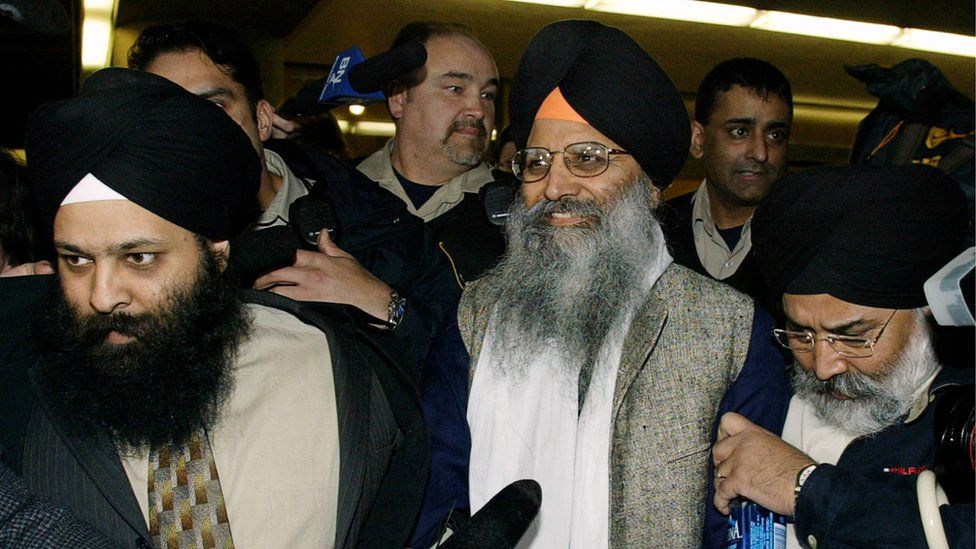Terrorism in Canada
"[He was found] suffering from gunshot wounds. The man was provided first aid by attending officers until Emergency Health Services took over his care. The injured man succumbed to his injuries on scene.""This appears to be a targeted shooting. A suspect vehicle was located in the 12200-block of 82 Avenue fully engulfed in fire.""The investigation is in the early stages and police are still looking for the suspects and a second vehicle that may have been used as a getaway vehicle."Constable Sarbjit K. Sangha
 |
| Sikh activist Ripudaman Singh Malik (centre) was found not guilty in the 1985 bombing of an Air India flight Reuters |
Back
in 1985 a dreadful terrorist attack took place that took the lives of
hundreds of Canadian citizens of East Indian origin. Two suitcase bombs
had been planted on two Air India passenger jets. One detonated
prematurely and took the lives of two Japanese baggage handlers at
Narita Airport in Tokyo. The other exploded over the Atlantic and all
320 passengers and crew of Air India Flight 182 were killed. That was
June 23, 1985. This pre-dated the 9/11 attack that took thousands of
lives as the handiwork of al-Qaeda.
At
the time, there was an active anti-India group in British Columbia
comprised of Canadian Sikhs who campaigned (illegally in India) for a
separate homeland they called Khalistan. After 1948's partition when
Pakistan broke away from India to become a Muslim state, and then
Bangladesh broke away from Pakistan, it's likely that India felt it had
surrendered more than enough of its territory. There is simmering
resentment between Hindus and Muslims in the region.
The
breakup of the territory that India claimed as its own gave rise to
horrendous slaughter as Hindus and Muslims both lost tens of thousands
in virulent bloodshed as Muslims streamed out of India to gather in
Pakistan and Hindus left Pakistan to live among their own. Pakistan has
the second largest Muslim community in the world, and India still ranks
as the third largest home for Muslims in the world, after Indonesia, the
most populous Muslim nation.
India
has untold numbers of ethnic groups, religions and languages
represented within her vast population. As a democracy it is not spared
the universal conflict that occurs when tribal, ethnic, sectarian groups
conflict with one another. The Khalistan movement representing the
yearning for a Sikh homeland is one of those conflicts. A man living in
Vancouver, Inderjit Reyat, was convicted of manslaughter in both
bombings.
The
mastermind behind the plot was thought to be Ripudaman Singh Malik. And
his associate in the bombing Ajaib Singh Bagri. At the time in Canada,
other Canadian Sikhs were aghast at the militant violence being
expressed by the Babar Khalsa group. Those who publicly condemned them,
including a Sikh B.C. newspaper editor, became victims of violence. One
of those victims later became premier of British Columbia, and later yet
a Member of Parliament; Ujjal Dosanjh.
It
took until 2005 before the two accused in the bombings were to stand
trial. Ultimately after a controversial trial, both men were acquitted
by a provincial Supreme Court justice, cleared of murder and consp8ircy
charges. After the assassination of Indian Prime Minister Indira Gandhi
by two of her Sikh bodyguards in retaliation for the Indian military
entering the Golden Temple of Amritsar, Sikhism's most holy gurdwara, to
roust out militant Sikhs from using it as a weapons depot and
headquarters.
Ripudaman
Singh Malik was a free man, able to go about his business and he had
many businesses, including schools for Sikh-centric education that he
founded as a highly respected member of his community. At his trial, it
was decided that the harrowing testimony of guilty involvement given by a
former member of the group detailing Malik's role in the bombing could
not be trusted, leading to his acquittal.
Yesterday
a rather rough justice took centre stage, with Ripundaman Singh Malik's
assassination. Just outside one of his businesses he was attacked,
three gunshots rang out, an ambulance arrived to take him to hospital
and he was pronounced dead. There will be an investigation. There will
be an effort to discover the killers' identities and the reason for his
assassination at this late date. The RCMP in its original investigation
following Air India's bombing was unable to gather evidence to convict
the man due to investigative incompetence. There may be a replay of that
incompetence.
Labels: Air India Bombing, British Columbia. India, Khalistan, Radical Sikhs

<< Home